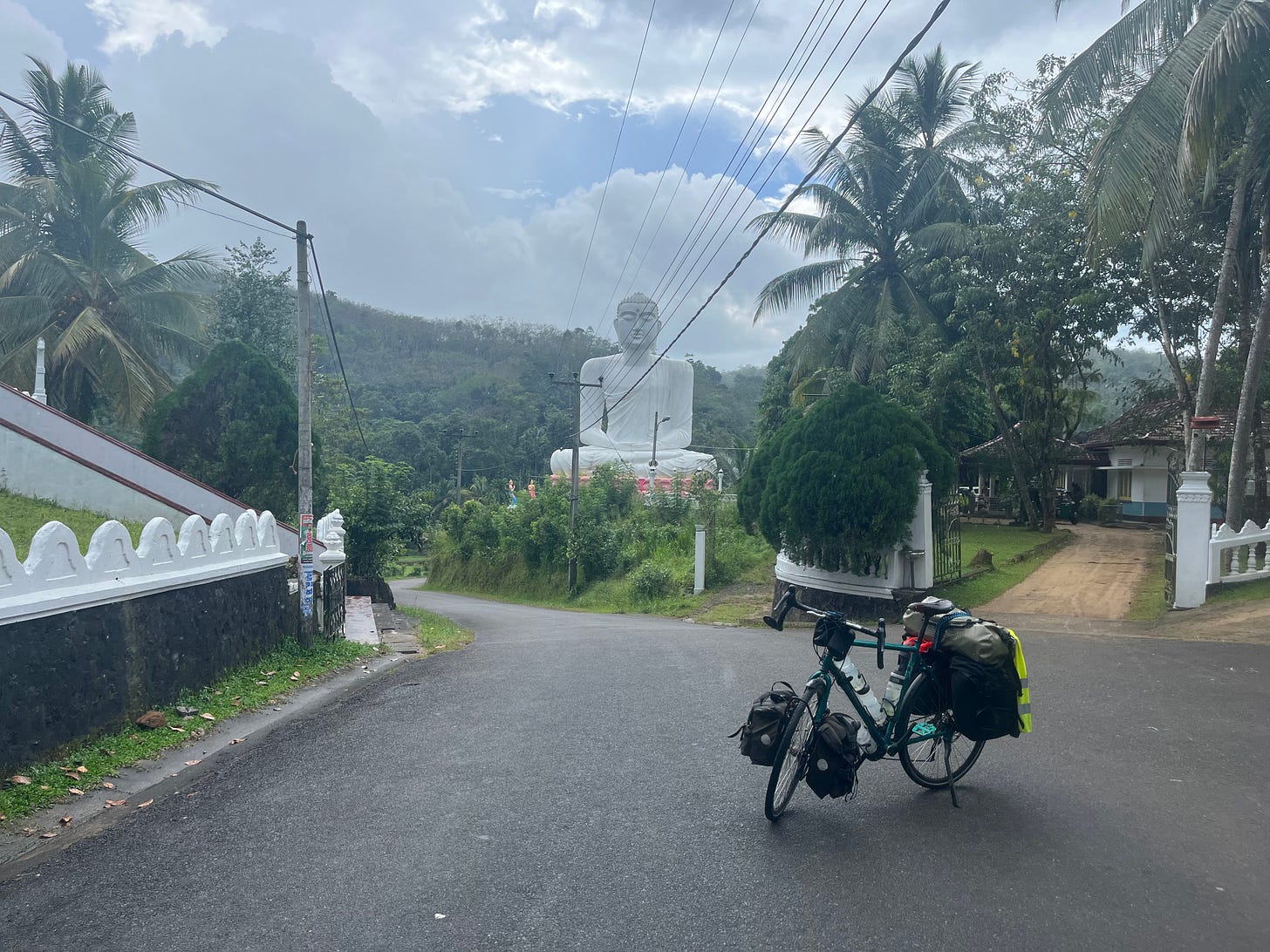172 | I still can’t surf
Hiriketiya, Sri Lanka
Many parts of Sri Lanka’s south coast were untouched by tourism until recently. My surf instructor tells me he and his friends discovered the Hiriketiya surf spot in 2012 (where I now sit). It was immaculate; the rainforest collapsed over the untrodden beach. He started the first cafe here: a king coconut stand.
Now Hiriketiya is a little touristy, but not unbearably so. It’s still clean and surrounded by jungle out of which monkeys and giant squirrels with heavy black tails climb. Along the shore, there’s a row of surf hire shacks stacked with white, yellow and blue boards, staffed by handsome Sri Lankan men. Behind are many restaurants — Marindi, Blue Beach — and chic cafes like Taboo and Dolce. There is a line of parked Tuk Tuks, green and red and blue, waiting to take tourists to nearby beaches. A bread truck incessantly whistles Jingle Bells at a high pitch to let us know they are near.
It’s getting dark in Muru’s Place, a family guest house. The fan spins above me, not quite silent. Mosquitos eat my legs. In this paradise, I am still bad at surfing and I’d like to unpack how bad I am this week.
The chances of being naturally talented in a broad range of skills and interests are slim. Being naturally gifted in even one domain is rare. Therefore, becoming a better swimmer, surfer, writer, or musician takes effort.
Doing the task itself consumes our effort, for example physical exertion in swimming.
Most of our effort, however, is spent on simply resolving that it’s okay to be bad at a skill before we become good at it.
It’s energy spent publically failing and persevering, ideally with a smile.
I am not good at surfing. My rash vest balloons with water as I get swept under the breaks and when I surface I shake out my hair and spit out the salt and hope my contact lenses are still in; I start in the shallows, then swim for a while and somehow return to the shallows all the while never having caught the wave. Inspired by great friends in Cornwall, I tried to learn when I was eighteen but didn’t commit the time. I did, however, commit to blaming my circumstances. I blamed the surf as it was choppy or sometimes too flat and often too busy, and perhaps (I wondered) my board was the wrong length. These were excuses, and I made them.
There are lots of things I would like to do that I haven’t for fear of being quite shit; the discomfort of discovering I’m not naturally good at something (not a pleasant feeling) has also put me off continuing. I once tried learning Italian and German, yet I didn’t just sit immersed in the state of being terrible at speaking Italian or understanding German. It was too uncomfortable, so I dropped them all altogether.
Sasha Chaplin refers to this skills gap of being a beginner as “The Moat of Low Status”, and it’s a moat because we must cross it to become proficient (or high status) at some skill. Sasha writes, “The water [of the Moat] is mind-control water. It speaks in your thoughts. Once you’re swimming, you will tell yourself, convincingly, in your own words, that you will drown in the Moat, that you should turn back. The far shore will seem impossibly distant. The current, meanwhile, would carry you home so reassuringly if you just yielded to it.”
Getting to the other side of the Moat is necessary, demanding and rewarding. Suppose our lives are spent on the near bank of the Moat, only rarely and tentatively dipping our toe in and withdrawing it in horror. “It didn’t agree with me”, I might say when I, more honestly, didn’t like to *know* I was terrible at a new skill. By not taking the risk of being publically rubbish, we miss the potentiality of our lives: you might have been a wonderful poet, just like you always deep down suspected, but you were never happy to be horrible at it — really tragically bad — and never attempted to cross the Moat.
Remember, the experts were once themselves rubbish. Swift once sang her first note and it was flat; Orwell wrote his first word — was it spelt wrong?
Unfortunately, I now have no more bad excuses for bad surfing, unlike when I attempted to surf in Cornwall. I am a better swimmer than I ever have been and should be able to catch the waves if I paddle decisively; the surf is good and the waves are empty on the beginner beach; my teacher discovered the beach (lol) and even taught Chris Martin (albeit, he is not well known for his barrel rides).
So there couldn’t be better conditions to learn. Even so, I remain bad at surfing and that’s okay, because if I don’t quit, I’ll eventually be good.
My week in books…
Steppenwolf by Herman Hesse. This is a classic, excellent, Hesse philosophical novel about each of us having some wild, untamable beast inside us. HH answers the question, “how do we find salvation?” If you’ve read Siddharta and Demian, read this next. A quote: “But it’s a poor fellow who can’t take his pleasure without asking other people’s permission.”
Reading: Stalin: Paradoxes of Power by Stephen Kotkin. A Distant Mirror by Barbara Tuchman.
Live well,
Hector





